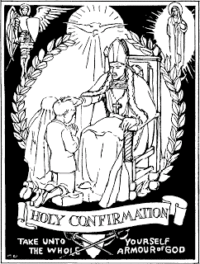
CHAPTER 8
Christian life is not easy:
It requires the discipline of perseverance and on-going repentance. We understand that there is a spiritual battle going on in the world and in the human heart, a struggle between good and evil. We who follow Christ are imperfect and tempted like all people, and we fail at times to choose what is good. So we must at once persevere in resisting evil and temptation and, when we stumble, be ready to repent and turn again to the way of God.
The Scripture describes the world God made as “very good.” God the creator filled all things with blessing and grace, and he created men and women in his own image. Anglicanism sees life and human nature as originally and essentially good.
The world and human nature, however, are “fallen” from perfection thus become flawed. This is what Genesis 2 describes and what the Church teaches as “original sin.” It is as if the human race has a disease called Sin…and Jesus Christ is the cure for the sin and heals us. God gave us the gift of freedom, an essential aspect of being made in God’s image. We misused our freedom, choosing evil rather than the way of God. To be human is to be tempted constantly to fall into sin, to allow ourselves to give into things such as greed, hatred, pride and prejudice, to name only a few. The Great Litany of The Book of Common Prayer (page 54) is one of the best summaries we have of the perpetual evils and temptations of human existence.
As Disciples of Christ we are to strive to say “no” to the sinful desires of the heart and to all the forces that hurt and destroy God’s good creation. This requires prayerful discernment, self-examination, and will power – all enlivened by grace, without which we cannot choose rightly. It is the Church’s responsibility to feed the flock with the Sacraments of the Church, thus strengthening the sheep so that they can resist the wolves.
We are to “persevere,” to hold fast in choosing good and resisting evil. Yet the reality is that we all choose wrongly at times. We do fall into sin, behavior and attitudes that separate us from God and one another. The compassion and mercy of God are infinite, as the Bible ceaselessly tells us. Jesus Christ poured himself out on the cross for our salvation and healing (curing us), that we might know that we are forgiven and reconciled. As Paul wrote in Romans 8, “There is now no condemnation for those who are in Christ Jesus… [and] if God be for us, who is against us?”
It is such grace that enables us to repent and return when we miss the mark. Repentance is what we must do when perseverance fails. The word “repent” has become distorted for many of us, carrying loads of guilt and threat. “Repent or else!” the sign on the mountain road tells us.
“Repent” is really a very positive word in the Bible. It comes from the Greek metanoia, which means to change your mind or change your course. It is about transformation, turning from our way to God’s way. William Temple said it very well once, “Repentance does not merely mean giving up a bad habit. What it is concerned with is the mind; get a new mind…[for] to repent is to adopt God’s viewpoint in place of your own. In itself,
far from being sorrowful, it is the most joyful thing in the world,
because when you have done it, you have adopted the viewpoint of truth itself, and you are in fellowship with God.”
The essential thing necessary for true repentance is the vision of God. It is when we see God as all love and goodness and joy that we deeply desire to walk in his ways rather than in the way of self and the world. This enables us to turn toward what is the good and walk in the way of peace.
To say, “I will, with God’s help” to this question means to strive for the good and to contend against evil. But it also means for us to understand that no one of us is perfect and that our spiritual journey is one of on-going repentance. We cannot make ourselves like Christ, but Christ can make us like himself, when we turn ourselves to him.
The Creed commits us to striving to be persons who communicate and show forth the Gospel of Jesus Christ to others. This is critically important both for us as individuals and for the mission of the Church. If the Gospel of grace is life-giving for us, we must bear witness to it. As the old saying goes, “a joy that is not shared, dies young.” Think of it this way – you may be the only bible some people may ever know – through your life you show forth the Gospel to others.
Asked late in life why they were a Christian and he replied that he believed that it was because of a woman who was a librarian in the small town of his childhood. Her kindness to him and her shining faith were a witness to the love of Christ that touched him deeply. It was because of her witness that he was a Christian!
Most of us can remember someone like that in our lives, whose witness and example were instrumental in our coming to know the love of God in our lives.
Proclaiming by word and example the Good News of Christ means simply sharing your enthusiasm and joy about the Christian faith with others so that they can discover it for themselves. The Good News is the life transforming word that we are saved by grace through faith, a word the world desperately needs to hear. The saying goes “Christianity must be caught, not taught,” and there is some truth in this saying. If the faith is to be caught we must be contagious Christians. Faith is caught from others who are passionate enough to share it with us, to invite us to church or to a Bible study, or to join in ministries which are showing forth the love of God. We catch it from those whose lives are animated by the grace and mercy of Christ and who live their faith in visible ways. We catch it from others whose joy in God shines forth.
Francis of Assisi is credited with saying, “In all things preach the Gospel; only if necessary use words.” Sometimes we Anglicans are unsure about the words to use. We are not comfortable with simplistic formulas, preferring the mystery of liturgy and the practices of love. Sometimes we need to be less shy and reserved and speak of the power of God’s grace in our lives.
Nevertheless we profess “in word and deed,” however, because our actions are always the key element it good to remember “Don’t talk of love; show me” was sang by Eliza Doolittle in My Fair Lady. The most effective way to bring others to know Christ is by living our faith in the world and inviting others to come with us. This happens as we practice the love of Christ in our relationships, in our work, and in our daily living. This happens as we care about others enough to invite them to church with us and to share in ministries which make a difference for good. It happens as we are good stewards of our gifts. “Come and see,” said Philip to Nathaniel in John 1:46, some of the first words of Christian evangelism. We are called to do the same.
How can your life more clearly proclaim the Gospel to others? To whom can you reach out and say “come and see”? How can we be more welcoming and open to newcomers? How can you more clearly articulate the power of Christ’s love in your life? Who is waiting for you to be the face of Christ for them? How can each of us become a more contagious Christian?
Christian living is expressed in active love for others. Our faith is not just about piety and study; it has to be lived. When Jesus was asked what the greatest commandment was, he put together two parts of the Torah in Hebrew Scripture. “’You shall love the Lord your God with all thy heart, and with all thy soul, and with all thy mind.’ This is the first and great commandment. And a second is like unto it: ‘You shall love your neighbor as yourself’” (Matthew 22:37-40). Our “vertical” relationship with God is to be lived in our “horizontal” relationship with others. The two are like each other.
Thus we see the crucial importance of loving other people as Christ loves us. Such loving was a hallmark of Jesus’ earthly ministry. He constantly gave himself for others. His parables, such as the Good Samaritan and the Last Judgment in Matthew 25, often pointed radically to compassion and love as the essential values of the kingdom of God. This is what faith in action looks like.
The commandment to love our neighbor as ourselves is a challenge to our human nature. Our natural tendency is to want to take and possess things for ourselves. William Blake’s famous drawing of Adam after he has been expelled from the Garden shows him saying, “I want. I want.” The suggestion is that our fallen nature is hung up on ourselves and our own needs. As Martin Luther said, we are “incurvatus in se,” turned in on ourselves.
When we are grasped by the love of God in Christ, we are turned around, focusing outwardly on God and others rather than just on ourselves. It is not in having, Jesus said, that we receive but in giving. This is the way of agape, the love that the New Testament says is God’s love. This question goes even farther than this, however. It commits us to seeking and serving Christ in all persons. That is, we are to see Christ present in others and learn that when we serve them, we are serving Christ himself.
This remarkable challenge is rooted in the Parable of the Last Judgment in Matthew 25, where we are given a picture of the judgment of the nations at the end of time. The ones who are judged to be righteous by the Son of Man are so, he says, “For I was hungry and you gave me food, I was thirsty and you gave me drink, I was a stranger and you welcomed me, I was naked and you clothed me, I was sick and you took care of me, I was in prison and you visited me.” When they are astonished by these words, he concludes, “as you did it to one of the least of these who are members of my family you did it to me.” In other words, the judgment will be based on our love of neighbors in need.
Here we are pointed to one of the deepest mysteries of Christian faith. The word of God was made flesh in Jesus Christ in the Incarnation, so that we could know God as a person. Matthew 25 and this question tell us that the Incarnation is extended as we come to see Christ in one another.
C.S. Lewis once wrote, “Next to the blessed sacrament itself the holiest object presented to our eyes is our neighbor. For, in almost the same way, in your neighbor Christ is truly present.” This is why we must seek and serve Christ in all persons, not just our closest friends and family. Christ is present in the poor, the sick, the alone, the stranger, in those who may differ greatly from us. To see Christ in them is to be transformed and to be liberated to love them as we are loved.
Christian history has always seen God’s people engaged in the tough issues of human life. Anglicans have founded hospitals and orphanages, have started soup kitchens and clothing and food banks, have been involved in the struggles for civil rights and women’s rights, and have fought against slavery and oppression of many kinds. This we believe is an essential aspect of God’s work through his Church
Each human being has dignity and worth because each is made by God and loved by God equally. However, to love and respect our brothers and sisters does not mean that we condone the sin that breaks them away from that “goodness” of which we were born. Love the person is required but it is not required that we love the sin.
In their book Christian Believing, John Westerhoff and Urban T. Holmes draw an interesting contrast between what they call “religion of escape” and the “religion of involvement.” The first seductively invites us to find in God a way to get beyond the pain and difficulty of the world, promising—in one way or another—that God’s primary business is to make us happy. Religious cults often offer such religion, which is a distortion of Biblical faith. The faith of the Scriptures and of Christ involves us in the difficulty and struggles of the world, promising not easy answers but trust in the ultimate triumph of God over the brokenness of life. The religion of involvement sends us into the world to help the poor and work for justice.
Anglican Christians have always strived to engage the hard issues of human history in order to be faithful to God’s vision for the world, and such a way of “worldly holiness is not easy. The peace that is promised is not that of spiritual tranquility but that of love’s fire and compassion.
The gifts He gave were some who would be: apostles; and some, prophets; and some, evangelists; and some, pastors and teachers; For the perfecting of the saints, for the work of the ministry, for the edifying of the body of Christ: Till we all come in the unity of the faith, and of the knowledge of the Son of God, unto a perfect man, unto the measure of the stature of the fulness of Christ: Ephesians 4:11-13.
It is clear from scripture that God has equipped each of us with various gifts and abilities which are best used for the glory of God and the welfare of God’s people. Examine the classic passages of Romans 12: 4-8 (For as we have many members in one body, and all members have not the same office: So we, being many, are one body in Christ, and every one members one of another. Having then gifts differing according to the grace that is given to us, whether prophecy, let us prophesy according to the proportion of faith;
Or ministry, let us wait on our ministering: or he that teacheth, on teaching;
Or he that exhorteth, on exhortation:
he that giveth, let him do it with simplicity;
he that ruleth, with diligence;
he that sheweth mercy, with cheerfulness);
I Corinthians 12: 4-11 (Now there are diversities of gifts, but the same Spirit. And there are differences of administrations, but the same Lord. And there are diversities of operations, but it is the same God which worketh all in all. But the manifestation of the Spirit is given to every man to profit withal. For to one is given by the Spirit the word of wisdom; to another the word of knowledge by the same Spirit; To another faith by the same Spirit; to another the gifts of healing by the same Spirit; To another the working of miracles; to another prophecy; to another discerning of spirits; to another divers kinds of tongues; to another the interpretation of tongues:
But all these worketh that one and the selfsame Spirit, dividing to every man severally as he will.) and you will find confirmation that God intends us to understand ourselves as gifted people with the responsibility of using those gifts to “build up the Church” into its full potential. The church is a community of diverse persons who are called to discern their own unique contributions, to grow in love and unity with each other. We are Christ’s ambassadors (II Corinthians 5:20) and in general our work is to respond both to God’s claim on our lives and God’s call to mission.




